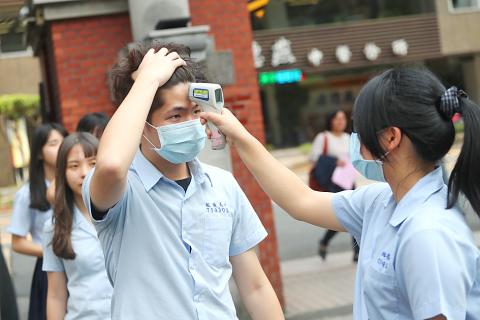The Ministry of Education is distributing 6.45 million masks to schools from kindergarten to 12th grade (K-12), as well as after-school institutions as part of government efforts to contain the COVID-19 outbreak as the spring semester starts today.
As K-12 schools reopen after a two-week delay due to the outbreak, the ministry said that it is also providing them with 25,000 infrared thermometers and 84,000 liters of alcohol-based sanitizers.
Of the 6.45 million masks, 500,000 have been earmarked for private kindergartens, 770,000 for after-school tutoring institutions and childcare centers, and 5.18 million for K-12 schools, Department of Planning head Huang Wen-ling (黃雯玲) said on Sunday.

Photo: CNA
The masks are for “backup” purposes and should be used only in emergency situations, such as if a child or teacher develops a fever, cough, sore throat or respiratory symptoms, Huang added.
The thermometers are being distributed in two batches, with 12,500 units having been delivered as of yesterday and 12,500 more to be delivered by Monday next week, she said.
The distribution of 40,000 liters of alcohol-based sanitizers to private kindergartens and other institutions started on Feb. 10 and would be completed within three weeks, while another 44,000 liters are being distributed to schools over a three-week period that started on Monday last week, Huang said.
Most of the nation’s universities are to begin their spring semester on Monday next week after an extended break due to the coronavirus outbreak.

Taiwan has received more than US$70 million in royalties as of the end of last year from developing the F-16V jet as countries worldwide purchase or upgrade to this popular model, government and military officials said on Saturday. Taiwan funded the development of the F-16V jet and ended up the sole investor as other countries withdrew from the program. Now the F-16V is increasingly popular and countries must pay Taiwan a percentage in royalties when they purchase new F-16V aircraft or upgrade older F-16 models. The next five years are expected to be the peak for these royalties, with Taiwan potentially earning

STAY IN YOUR LANE: As the US and Israel attack Iran, the ministry has warned China not to overstep by including Taiwanese citizens in its evacuation orders The Ministry of Foreign Affairs (MOFA) yesterday rebuked a statement by China’s embassy in Israel that it would evacuate Taiwanese holders of Chinese travel documents from Israel amid the latter’s escalating conflict with Iran. Tensions have risen across the Middle East in the wake of US and Israeli airstrikes on Iran beginning Saturday. China subsequently issued an evacuation notice for its citizens. In a news release, the Chinese embassy in Israel said holders of “Taiwan compatriot permits (台胞證)” issued to Taiwanese nationals by Chinese authorities for travel to China — could register for evacuation to Egypt. In Taipei, the ministry yesterday said Taiwan

Taiwan is awaiting official notification from the US regarding the status of the Agreement on Reciprocal Trade (ART) after the US Supreme Court ruled US President Donald Trump's global tariffs unconstitutional. Speaking to reporters before a legislative hearing today, Premier Cho Jung-tai (卓榮泰) said that Taiwan's negotiation team remains focused on ensuring that the bilateral trade deal remains intact despite the legal challenge to Trump's tariff policy. "The US has pledged to notify its trade partners once the subsequent administrative and legal processes are finalized, and that certainly includes Taiwan," Cho said when asked about opposition parties’ doubts that the ART was

If China chose to invade Taiwan tomorrow, it would only have to sever three undersea fiber-optic cable clusters to cause a data blackout, Jason Hsu (許毓仁), a senior fellow at the Hudson Institute and former Chinese Nationalist Party (KMT) legislator, told a US security panel yesterday. In a Taiwan contingency, cable disruption would be one of the earliest preinvasion actions and the signal that escalation had begun, he said, adding that Taiwan’s current cable repair capabilities are insufficient. The US-China Economic and Security Review Commission (USCC) yesterday held a hearing on US-China Competition Under the Sea, with Hsu speaking on